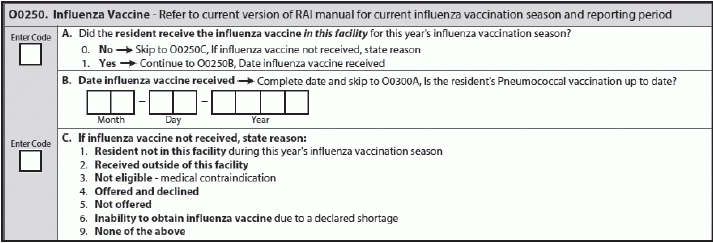Perfect Your Flu Vaccine Coding With These 3 Scenarios
What to do when you can’t determine whether resident received vaccine.
Like other nursing facilities, yours is in the midst of flu season, and you’ve likely been paying more attention to your coding of Item O0250 — Influenza Vaccine. Although this item may seem as though it requires an easy “yes” or “no” response, the following scenarios illustrate how coding O0250 can trip you up.
When Assessment is Right Before Vaccine Becomes Available
Scenario #1: The resident received the influenza vaccine last fall, shortly after your facility received the vaccines. She has remained in the facility, and it is now August. Although this year’s flu vaccine is not yet available, you are completing the resident’s annual assessment. How should you code O0250?
Answer: You should code O0250A — Did the resident receive the influenza vaccine in this facility for this year’s influenza vaccination season? as 1 — Yes, according to the Oklahoma State Department of Health Quality Improvement & Evaluation Service (OSDH).
The RAI Manual states: “Once the influenza vaccination has been administered to a resident for the current influenza season, this value is carried forward until the new season begins.” And the influenza season begins as soon as the vaccine is available in your area each year, OSDH notes. Then, for O0250B — Date influenza vaccine received, you would refer to the resident’s medical record and record the date the resident received the vaccine and whether he received it in your facility (O0250C — If influenza vaccine not received, state reason).
When Your Facility Delays Vaccinations
Scenario #2: The flu vaccine was available in your area in August, but your medical director decided not to administer any vaccine until October. All current residents received the flu vaccine for the last flu season. How should you code O0250A, O0250B and O0250C?
Solution: If the vaccine was available but not offered to the resident, you would code O0250A as 0 — No, skip O0250B, and then code O0250C as 5 — Not offered, according to the Pennsylvania Department of Health’s (PADH) November 2014 RAI Spotlight.
The bigger problem here, however, is not your MDS coding but the facility’s influenza vaccine administration practices. The U.S. Centers for Disease Control and Prevention (CDC) recommends that all residents receive the influenza vaccine annually, before the flu season, PADH stated. And facilities should begin vaccinations as soon as the flu vaccine is available.
When You Don’t Know Whether Resident Received Vaccine
Scenario #3: Due to dementia, the resident cannot tell you whether she’s received the influenza vaccine this season, and she was not in your facility during this year’s flu season. It is now June. Reviewing her prior medical records doesn’t give you any clues as to whether she’s received the vaccine. How should you code O0250?
What to do: First, code O0250A as 0 — No, and then skip to O0250C as the skip pattern indicates. For O0250C, you have several different options to choose from:
1 — Resident not in this facility during this year’s influenza vaccination season
For this example, you would code O0250C as 1 — Resident not in this facility during this year’s influenza vaccination season.
If the influenza vaccine is available at the time of this assessment, however, and you cannot determine the resident’s vaccination status, you would vaccinate the resident according to clinical standards of practice, according to a recent presentation by independent consultant Jennifer Pettis, BS, RN, WCC.
In this case, you would then code A0250A as 1 — Yes, and then record the date upon which the resident received the vaccine in A0250B.
Tip: When you don’t know whether the resident received the flu vaccine, keep in mind that the HIPAA Eligibility Transaction System (HETS), or Common Working File (CWF), will have a record of all Medicare Part B preventive measures billed to the program, points out Marilyn Mines, RN, BC, RAC-CT, MDS Alert consulting editor and senior manager of clinical services for FR&R Healthcare Consulting Inc. in Deerfield, IL.
Whoever has access to these programs can look up the most recent billing information and you will see what date the flu vaccine was given, Mines suggests.
Resource: For more information on best clinical practices regarding influenza vaccination, go to www.cdc.gov/flu/professionals/infectioncontrol/ltc-facility-guidance.htm. Also, the CDC recently released a free toolkit on influenza vaccinations among health care personnel in the long-term care setting; this toolkit is available at www.cdc.gov/flu/toolkit/long-term-care/.
2 — Received outside of this facility
3 — Not eligible – medical contraindication
4 — Offered and declined
5 — Not offered
6 — Inability to obtain influenza vaccine due to a declared shortage
9 — None of the above

